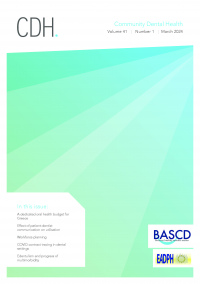September 2012
Editorial - Population based health and care: what does the new dental professional need to know?
Abstract
What should dentists and other members of the dental team be taught during their undergraduate or prequalification training? This is a question that engenders much debate. Of particular interest to the readers of this Journal, is what they should they be taught in the spheres of community and dental public health? The answer to this question, at least as far as the UK is concerned, is revealed in a recent publication by the General Dental Council (GDC), the UK regulatory authority. “Preparing for practice – learning outcomes for registration” (GDC, 2012) sets out the learning outcomes expected at first registration, not only for dentists but for all dental professionals. This publication replaces “The First Five Years”, which has guided UK dental curricula for over a decade. The skills required of each registrant group are now set out in four domains; clinical skills, communication, professionalism, and, leadership and management. In the clinical skills section, the following learning outcomes have been identified under the heading, “Population based health and care”. It is expected that upon registration with the GDC, the registrant will be able to: • discuss the basic principles of a population health approach including demographic and social trends, UK and international oral health trends, determinants of health and inequalities in health, and the ways in which these are measured and current patterns • describe the dental and wider healthcare systems dental professionals work within including health policy and organisation, delivery of healthcare and equity • describe and evaluate the role of health promotion in terms of the changing environment, community and individual behaviours to deliver health gain • evaluate evidence-based prevention and apply appropriately • explain the principles of planning oral health care for communities to meet needs and demands (GDC, 2012). These outcomes have been set not only for dentists but for all registrant groups except dental technicians for whom a refined set of population related learning outcomes have been devised. In the past, acquiring the clinical and technical skills necessary for the practice of dentistry were often attributed much greater importance by many dental undergraduates (and some of their teachers) than an understanding of the wider context in which they would spend the rest of their working lives. These new learning outcomes provide a welcome confirmation of the importance attached to newly qualifying dental professionals being taught from a population perspective and expand on the previous somewhat narrow perspective of health promotion However, the new learning outcomes have implications for dental public health teaching beyond the strict confines of the discipline. “Preparing for practice” states that all dental professionals must understand the principles of evidence-based practice and be able to make appropriate decisions on patient care using this approach. Critical appraisal skills, research methods and statistics, the fundamentals to understanding evidence based practice, are disciplines that in many dental schools often fall to the Dental Public Health team to teach. Add the GDC’s core domains of communication and leadership and management to the agenda and it becomes apparent that the role of dental public health team in dental education is of even greater importance. Beyond the UK, the profile and competences for the graduating European dentist have been described by the Association for Dental Education in Europe (Cowpe, 2010). Domain VII of that document describes improving oral health of individuals, families and groups in the community. Knowledge of the organisation and provision of health care, the prevalence of common dental conditions and of the social, cultural and environmental issues that contribute to ill health are all seen as necessary attributes of a new European dental graduate. At a time when dental schools are facing financial constraints, there is always the chance that dental public health may be seen as an additional luxury to the dental educational experience. The documents discussed here set out clearly the central role that community and public health dentistry plays in the competences and knowledge expected of the newly registering dental professional. This enlightened and up-to-date view of the teaching of our discipline to all who aspire to join the profession is to be welcomed. References Cowpe, J., Plasschaert, A., Harzer, W., Vinkka-Puhakka, H. and Warmsley, A.D. (2010): Profile and competences for the graduating European dentist – update 2009. European Journal of Dental Education 14, 193-202. General Dental Council (2012): Preparing for practice – learning outcomes for registration. www.gdc-uk.org 194




